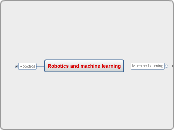by Daniel Blakely 16 years ago
802
Robotics and machine learning
Mind map learning about robotics as well as machine learning

by Daniel Blakely 16 years ago
802

More like this
Heuristic searching
Exhaustive searching
Example: ontable(b).
Requires a goal concept, and domain knowledge
Represented in a way which can be manipulated using deductive and inductive logic
Uses a combination of a single example along with domain-related knowledge to explain the example
Follows three phases
Application
Validation
Training
Neural nets (artificial neural systems)
Represented in the connection weights of a highly interconnected set of simple nodes
Winston's Arch
Aim was to see if a program could develop a representation of the concept of an "arch"
System is provided with positive and negative examples
Uses these to make generalisations and form concepts
Has led to the impressive success of genetic algorithms in some domains
'Evaluation Function' was assigned a weighting or ranking
Improves performance over time
Difficult to transfer to machine learning
Very broad and ill-defined concept
Caching
Impractical in a complex scenario
Everything has to be stored
Form of rote learning
Learning by memorisation
Off by heart